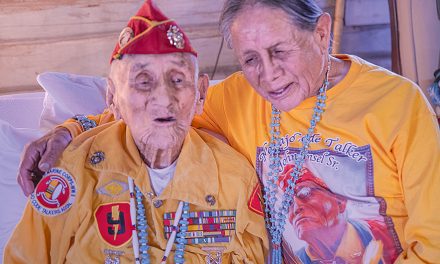
Ethics director denies conflict of interest in his acceptance of $102,000 consultant contract with controller’s office
By Marley Shebala
Special to the Times
WINDOW ROCK – Interim Navajo Nation Ethics and Rules Director Lewnell Harrison on March 12 said that it was not a conflict of interest for him to receive and personally benefit from a $102,001.68 contract with the controller’s office.
Harrison’s security guard business, Dine’ Protection Agency of Yatahey, New Mexico, received the $102,001.68 American Rescue Plan Act/ARPA contract with the controller’s office for consultant work from Jan. 1, 2022, to Dec. 31, 2022.
Harrison signed the contract on July 13, 2022, and former President Jonathan Nez signed it on Aug. 19, 2022, even though the contract services were from Jan. 1, 2022, to Dec.31, 2022.
According to the Navajo Nation Ethics and Rules Office website, the primary purpose of the ethics law is to address conflicts. The “conflicts of interest” law mandates, “No public official or employee shall use, or attempt to use, any official or apparent authority of their office or duties which places, or could reasonably be perceived as placing, their private economic gain or that of any special business interests with which they are associated, before those of the general public, whose paramount interests their office or employment is intended to service.”
The 2022 contract stated more than $102,000 for the Dine’ Protection Agency to provide “consultant” services for Interim Controller Elizabeth Begay, who was unavailable for comment because she is no longer the interim controller. President Buu Nygren replaced her with Sean McCabe on April 19, 2023.
Controller’s office
This reporter contacted McCabe through a written request for a list of contracts awarded to Dine’ Protection Agency and copies of the contracts on March 12. The controller’s accounting manager, Robert Willie, assured this reporter that he would email the written request to McCabe.
But by Tuesday, McCabe had yet to respond. As he left a budget meeting, this reporter caught up and asked him about the DPA contracts. McCabe said he had “no problem” releasing information about DPA’s contracts, but the Navajo Department of Justice informed him that the request for the contracts should go to NDOJ. The Navajo DOJ instructed this reporter to submit a written request on Tuesday.
According to the auditor general’s office, the controller’s office is the Navajo government entity that could provide a list of Navajo government contracts awarded to Dine’ Protection Agency.
The controller’s office initially denied the list request after staff contacted Harrison for permission to release information regarding DPA, and Harrison said no. This reporter requested the controller’s office policy that allowed contractors to decide if their Navajo government contracts were public documents. A copy of those policies was not provided by publication time Wednesday.
As this reporter waited in the controller’s office for documents, a Dine’ Protection Agency security guard was seen sitting behind the lobby desk, greeting individuals entering the lobby and asking if they needed assistance on March 12.
DPA at Council
This reporter repeatedly asked Harrison why the more than $102,000 ARPA contract for DPA to be consultants for the controller’s office was not a conflict of interest. Harrison was leaving an ethics hearing at the hearings and appeals office when Harrison was questioned March 12.
The OHA conducts hearings on ethics complaints. As interim ethics director, Harrison files with OHA after the ethics office investigates and finds sufficient evidence or probable cause to file an ethics complaint.
Harrison was an investigator for the ethics office before he was appointed interim ethics office director on Oct. 15, 2021. That’s according to former Speaker Seth Damon’s 2022 winter session report to the Navajo Council.
This reporter contacted Speaker Crystalyne Curley’s office for information regarding Harrison’s appointment and for a list of contracts that the legislative branch has or had with Dine’ Protection Agency. Curley did not provide an answer by Wednesday’s publication.
During several 2023 and 2024 Navajo Council meetings and sessions, DPA security guards were stationed at the east entrance of the Council Chamber.
Filing against ethics director
This reporter asked Navajo Nation Chief Prosecutor Vernon Jackson Jr. on March 12 whether an ethics complaint could be filed against Harrison and the process for filing such a complaint.
Jackson replied in a March 12 email, “Some important considerations related to section 3782 of the Navajo Nation Ethics in Government Law are that the Office of the Prosecutor or Special Prosecutor enforces criminal violations, which are misdemeanors punishable by fines and/or imprisonment, with harsher penalties for subsequent offenses.”
He also stated, “In other matters, a special prosecutor could be appointed consistent with 2 NNC §§ 2021-2024 to file a complaint alleging an ethics violation in connection with an administrative proceeding.”
Navajo Nation Code Title 2, sections 2021 to 2024, is the Navajo Nation Special Prosecutors Act, which provides a process for selecting a special prosecutor.
Special prosecutor law (sub)
According to the special prosecutor law, the Navajo Nation attorney general shall conduct a preliminary investigation based on the special prosecutor law when the attorney general receives information sufficient to constitute grounds to investigate whether any of the persons listed in the special prosecutor law have committed a violation of any federal or state criminal laws, any Navajo Nation laws or regulations, or committed any act upon which the Navajo Nation may file a civil complaint.
The special prosecutor law mandates that the attorney general can take up to 60 days to conduct a preliminary investigation.
Special prosecutors were selected and hired to prosecute and remove Chairman Peter MacDonald Sr., President Albert Hale, and a majority of the former 88-member Navajo Council.
The persons under the particular prosecutor’s jurisdiction are:
1. The Navajo Nation president;
2. The Navajo Nation vice president;
3. Any member of the Office of the President and Vice President executive staff;
4. Navajo Council standing committee chairpersons
5. The attorney general, in which case the deputy attorney general shall perform the functions of the attorney general based on the special prosecutor law;
6. The director or acting director or deputy director of any division, department, program, or executive branch offices and
7. Any other official, employee, or agent of the Navajo Nation, where the attorney general determines that investigation or prosecution or civil litigation against such person by the attorney general or other officer or employee of the Department of Justice may result in a personal, financial, or political conflict of interest.
‘Appearance of…’
The Navajo Nation conflict of interest ethics law mandates that “public officials and employees of the Navajo Nation avoid any action, whether or not specifically prohibited by the (ethics law) standards of conduct…which could result in, or create the appearance of:
1. Using public office for private gain;
2. Giving preferential treatment to any special interest organization or person;
3. Impeding governmental efficiency or economy;
4. Losing or compromising complete independent or impartiality of action;
5. Making a government decision outside official channels or
6. Adversely affecting the confidence of the people in the integrity of the government of the Navajo Nation.”
The provisions of the Navajo ethics law also address government contracts, economic interests, incompatible interests, confidential information, participation in decision-making, gifts and loans, use of public property and money, staff misuse, and the employment of relatives.








 Highway 264,
Highway 264, I-40, WB @ Winslow
I-40, WB @ Winslow